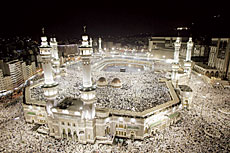Injunctions of Fighting before the Battle of Badr
Verses 190-194, Surah Al-Baqarah (Chapter 2)I seek refuge in Allah from the rejected Satan.
In the name of Allah, the Most Merciful, the Most Kind
The purpose of this article is to briefly explain the verses 190-194 of Surah (Chapter) 2 of the Holy Quran in the light of the time period when these were sent down by God to Prophet Muhammad (peace be on him), the Holy Quran itself, and the relevant sayings of the Prophet. First we give a translation of the verses.
2.190. Fight against those who fight against you in the way of Allah, but do not transgress, for Allah does not love transgressors.
2.191. Kill them whenever you confront them and drive them out from where they drove you out. (For though killing is sinful) wrongful persecution is even worse than killing. Do not fight against them near the Holy Mosque unless they fight against you; but if they fight against you kill them, for that is the reward of such unbelievers.
2.192. Then if they desist, know well that Allah is Ever-Forgiving, Most Compassionate.
2.193. Keep on fighting against them until mischief ends and the way prescribed by Allah prevails. But if they desist, then know that hostility is only against the wrong-doers.
2.194. The sacred month for the sacred month; sanctities should be respected alike ( by all concerned). Thus, if someone has attacked you, attack him just as he attacked you, and fear Allah and remain conscious that Allah is with those who guard against violating the bounds set by Him.
(translation taken from, Towards Understanding the Quran)
The Historic Context and the Nature of the Holy Quran:
The Holy Quran comprises of revelations from God to Prophet Muhammad over a period of twenty three years (610 C.E. – 632 C.E.). The first 13 years of the prophethood of Muhammad were at his hometown of Makkah, where he and his fellow Muslims were severely persecuted by the pagans of Makkah. During that time, Muslims were not ordered to fight back, but bear the persecutions. Finally, God ordered the Prophet and his fellow Muslims (known as Sahabah) to emigrate to the city of Madinah, about 400 kilometers away.This emigration, known as the Hijrah, marked the beginning of a mini Islamic state in Madinah, in which the Prophet became the head of the state. It was not long before the polytheists of Makkah marched towards Madinah to wage war against Muslims and destroy the Islamic state of Madinah. This battle is known as the Battle of Badr. The verses 2.190-2.194, above were perhaps the first injunctions from God to Muslims to prepare themselves for fighting. It was obviously a war in the defense of their homeland and their Faith.
In verse 2.190, God instructs Muslims to fight back, but not to transgress and remain just even during the battle. "They are told that material interests should not be the motivation for their fighting, that they should not take up arms against those were not in opposition to the true faith, that they should not resort to unscrupulous methods or to the indiscriminate killing and pillage which characterized the wars of the pre-Islamic era, the Age of Ignorance. The excesses alluded to in this verse are acts such as taking up arms against women and children, the old and the injured, mutilation of the dead bodies of the enemy, uncalled for devastation through the destruction of fields and livestock, and other similar acts of injustice and brutality. In the Hadith all these acts have been prohibited. The real intent of the verse is to stress that force should be used only when its use is unavoidable, and only to the extent that is absolutely necessary." (note 201, page 151, Towards Understanding the Quran, Volume 1)
Commentary on verse 2.192: "God, in whom the believers have faith, is forgiving and ready to pardon even the worst criminals and sinners after they have renounced their arrogant defiance towards Him. It is suggested that this attribute of God should be reflected in the behavior of the believers as well. As the saying goes: ‘Mould your morals according to the attributes of God.’ Hence, whenever the believers have to resort to armed conflict, they should do so not for the sake of quenching their thirst for vengeance but in the cause of God’s religion. Their conflict with any group should last only as long as that group resists the cause of God. As soon as it gives up this resistance hostility should cease. (note 203, page 152, as above.)
It should be emphasized that so many revelations in the Holy Quran came down to provide guidance to Prophet Muhammad and the Sahabah based on what they were confronting at that time. Therefore, it is important to understand and know the historic context of the revelations for a proper understanding of these verses.
